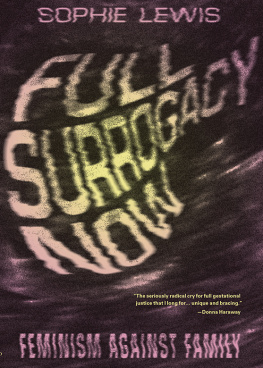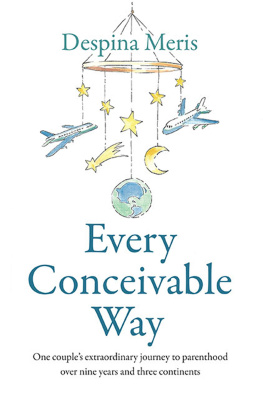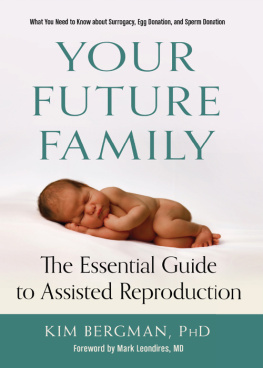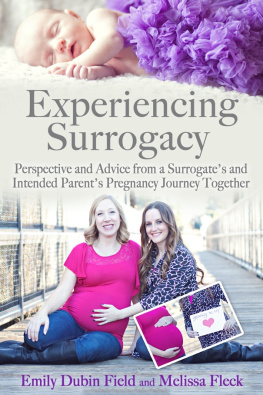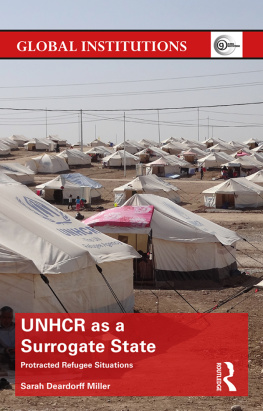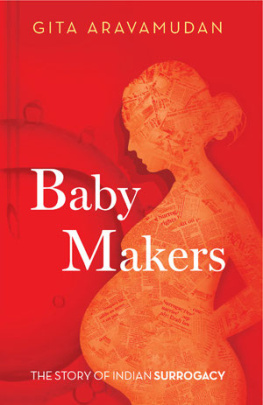Contents

Full Surrogacy Now
Full Surrogacy Now
Feminism Against Family
Sophie Lewis

First published by Verso 2019
Sophie Lewis 2019
All rights reserved
The moral rights of the author have been asserted
1 3 5 7 9 10 8 6 4 2
Verso
UK: 6 Meard Street, London W1F 0EG
US: 20 Jay Street, Suite 1010, Brooklyn, NY 11201
versobooks.com
Verso is the imprint of New Left Books
ISBN-13: 978-1-78663-729-1
ISBN-13: 978-1-78663-732-1 (UK EBK)
ISBN-13: 978-1-78663-731-4 (US EBK)
British Library Cataloguing in Publication Data
A catalogue record for this book is available from the British Library
Library of Congress Cataloging-in-Publication Data
A catalog record for this book is available from the Library of Congress
Typeset in Sabon by MJ & N Gavan, Truro, Cornwall
Printed in the UK by CPI Group
Contents
This book owes its existence to Rosie Warren. The other most obvious people to thank are Judy Thorne, whose years-long excitement about what Ive been trying to pursue here was contagious; the brilliant editrix and comrade Madeline Lane-McKinley; Alyssa Battistoni, my longtime partner-in-Harawavianism; Michelle OBrien, most passionate of readers; and Victoria Osterweil, my soul. In addition to these six women, the effort was made possible by the interest and encouragement of manya collection of past and present friends who either read the whole thing and provided crucial comments, or simply at some point said something that happened to inspire self-beliefNatasha Lennard, Ryan Ruby, Tom Houseman, Johanna Isaacson, Sarah Leonard, Richard Woodall, Mathura Umachandran, Paul Jackson, Yuan Yang, Anna Sidwell, Hannah Schling, Nick Evans, Sophie Williams, Molly Huzzell, Kate Hardy, Dave Bell, Kyle Stone, Jonny Bunning, Gwyneth Lonergan, Het Phillips, Hannah Berry, Petra Davis, Marie Thompson, Simon DuCon, Giles Lane, Max Fox, P. E. Moskowitz, Indiana Seresin, Jonathan Kopp, Sarah Brovillette, Merve Emre, Wilson Sherwin, Billy La Cava, Nelle Ward, Zach Howe, David Haub, Jenny Turner, Joanna Biggs, Patrick Harrison, Joy Kristin Kalu, Elise Thorburn, Matt McMullen, Elizabeth Johnson, Joshua Clover and Anne Boyer. I am equally indebted, of course, to everyone whowithout ever talking about surrogacyhanded me biscuits, cleaned for me, fed me, shared their scotch, bought me a pint, or picked up the pieces: you know who you are. Thank you to everyone who, in addition to Rosie, worked on this book at VersoDuncan Ranslem, Ida Audeh, Lyn Rosen, Emily Janakiram and Maya Osbourne. Thanks are due to my PhD supervisors Erik Swyngedouw and Noel Castree at the University of Manchester, who were kind and patient, arguing with me about reproduction and surplus value, and played their part as midwives of Cyborg Labour (the predecessor to this book) really admirably. And, lastly, Ill state that I was blessed with the time of gracious and solidaritous scholars Sharmila Rudrappa, Michal Nahman, Charis Thompson, Cindi Katz, Kalindi Vora, Pamela Fuentes, Reecia Orzeck, Claudia Garriga Lopez, Becky Mansfield, Kathi Weeks, and Donna Haraway. Insofar as the name on the cover of this book refers to me alone, (as though I were) a singular entity, it does not keep faith with the argument of the pages that follow.
It is a wonder we let fetuses inside us. Unlike almost all other animals, hundreds of thousands of humans die because of their pregnancies every year, making a mockery of UN millennium goals to stop the carnage. In the United States, almost 1,000 people die while doing childbirth each year and another 65,000 nearly die. This situation is social, not simply natural. Things are like this for political and economic reasons: we made them this way.
Pregnancy undoubtedly has its pleasures; natality is unique. That is why, even as others suffer deeply from their coerced participation in pregnancy, many people excluded from the experience for whatever reasonbe they cis, trans, or nonbinaryfeel deeply bereft. But even so, and even in full recognition of the sense of the sublime that people experience in gestating, it is remarkable that there isnt more consistent support for research into alleviating the problem of pregnancy.
The everyday miracle that transpires in pregnancy, the production of that number more than one and less than two, receives more idealizing lip-service than it does respect. Certainly, the creation of new proto-personhood in the uterus is a marvel artists have engaged for millennia (and psychoanalytic philosophers for almost a century). Most of us need no reminding that we are, each of us, the blinking, thinking, pulsating products of gestational work and its equally laborious aftermaths. Yet in 2017 a reader and thinker as compendious as Maggie Nelson can still state, semi-incredulously but with a strong case behind her, that philosophical writing about actually doing gestation constitutes an absence in culture.
What particularly fascinates me about the subject is pregnancys morbidity, the little-discussed ways that, biophysically speaking, gestating is an unconscionably destructive business. The basic mechanics, according to evolutionary biologist Suzanne Sadedin, have evolved in our species in a manner that can only be described as a ghastly fluke. Scientists have discoveredby experimentally putting placental cells in mouse carcassesthat the active cells of pregnancy rampage (unless aggressively contained) through every tissue they touch. Kathy Acker was not citing these studies when she remarked that having cancer was like having a baby, but she was unconsciously channelling its findings. The same goes for Elena Ferrantes protagonist in The Days of Abandonment, who reports:
I was like a lump of food that my children chewed without stopping; a cud made of a living material that continually amalgamated and softened its living substance to allow two greedy bloodsuckers to nourish themselves.
The genes that are active in embryonic development are also implicated in cancer. And that is not the only reason why pregnancy among Homo sapiensin Sadedins accountperpetrates a kind of biological bloodbath. It is the specific, functionally rare type of placenta we have to work withthe hemochorial placentawhich determines that the entity Chikako Takeshita calls the motherfetus tears itself apart inside.
No wonder philosophers have asked whether gestators are
Gestational Fix
Pregnancy has long been substantially techno-fixed already, when it comes to those whose lives really matter. Under capitalism and imperialism, safer (or, at least, medically supported) gestation has typically been the privilege of the upper classes. And the high-end care historically afforded to the rich when they gestate their own young has lately been supplemented by a technology that absorbs 100 percent of the damage from the consumers point of view: the human labor of a gestational surrogate. Surrogacy, as news media still report, began booming globally in 2011. Around 2016, the industry began suffering a series of setbacks: Thailand and Nepal banned surrogacy altogether for the foreseeable future, and other major hubs (India, Cambodia, and Mexico) legislated against all
Surrogacy bans uproot, isolate, and criminalize gestational workers, driving them underground and often into foreign lands, where they risk prosecution alongside their bosses and brokers, far away from their support networks. In July 2018, thirty-three pregnant Cambodians were detained and charged in Phnom Penh, together with their Chinese boss, for human trafficking offences.

